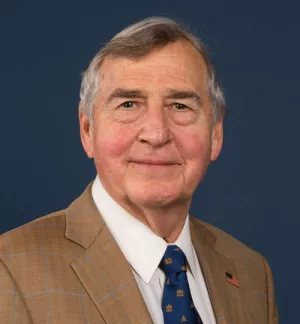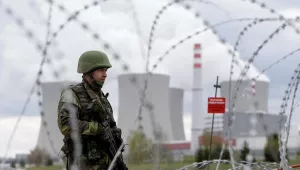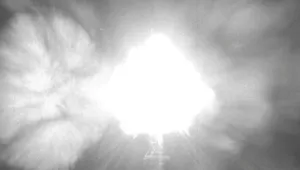For updated facts and research on nuclear security, visit our special initiative Nuclear Security Matters.
The Challenge
"Nuclear terrorism is the most serious danger the world is facing."
—Mohamed ElBaradei (former director of the IAEA and winner of the 2005 Nobel Peace Prize), February 1, 2009
Motives, Means, Opportunity
Motive
- In 1998, Osama bin Laden issued a statement, "The Nuclear Bomb of Islam," declaring that "It is the duty of Muslims to prepare as much force as possible to terrorize the enemies of God."
Means
- With 25 kg of HEU, terrorists could make an improvised nuclear device (IND).
Opportunity
- An IND can be delivered to its target along the same routes that bring drugs, illegal immigrants, and legal goods to major cities of the world.
Preventable
The civilized world can successfully prevent nuclear terrorism by just doing one thing: denying terrorists the means to achieve their deadliest ambitions by locking up all nuclear weapons and materials to a gold standard -- beyond the reach of terrorists and thieves. United Nations Security Council Resolution 1887 called upon member states to "raise standards of nuclear security to reduce the risk of nuclear terrorism, with the aim of securing all vulnerable nuclear material from such risks within four years."
Questions Answered In This Fact Sheet
- Who could be planning a nuclear terrorist attack?
- What nuclear weapons could terrorists use?
- Where could terrorists acquire a nuclear bomb?
- When could terrorists launch the first nuclear attack?
- How could terrorists deliver a nuclear weapon to its target?
Who could be planning a nuclear terrorist attack?
Al Qaeda, Chechnya-based separatists, Lashkar-e-Taiba, and Aum Shinrikyo have demonstrated interest in acquiring a nuclear weapon. Al Qaeda is known to be pursuing a long-term, persistent, and systematic approach to acquiring the bomb.
- Number of terrorist groups that have demonstrated interest in acquiring a nuclear weapon: 4
Al Qaeda, Chechnya-based separatists, Lashkar-e-Taiba, and Aum Shinrikyo - Number of terrorist groups that may be capable of acquiring and using nuclear weapons: 5
Al Qaeda, North Caucasus-based separatists, Lashkar-e-Tayyib, Hezbollah, Taliban - Number of known groups that have attempted to buy nuclear material on the black market: 2
Aum Shinrikyo and Al Qaeda - Number of years that Al Qaeda has been pursuing a nuclear weapon: 15
9/11 Commission (2004): "Al Qaeda has tried to acquire or make nuclear weapons for at least ten years... and continues to pursue its strategic goal of obtaining a nuclear capability."
What nuclear weapons could terrorists use?
They could buy, steal, or construct a nuclear weapon.
- What is the hardest part of making a nuclear bomb? Acquiring fissile material
- What fissile material is needed to make a nuclear bomb? HEU or Pu
- How difficult would it be for terrorists to get fissile materials? Not hard enough
There are hundreds of locations holding nuclear weapons or weapons-usable material and no binding global standards for how well these weapons and materials should be secured. There are more than 130 research reactors with HEU, some of which are in developing and transitional countries. - Once nuclear material is acquired, could terrorists make a nuclear weapon? Yes
U.S. Office of Technology Assessment (1977): "A small group of people, none of whom have ever had access to the classified literature, could design and build a crude nuclear explosive device... [O]nly modest machine-shop facilities that could be contracted for without arousing suspicion would be required." - Amount of HEU required to make a crude nuclear bomb: 25 kg
- Global stockpile of HEU: 1,600,000 kg
- Amount of Pu required to make a crude nuclear bomb: 8 kg
- Global stockpile of separated Pu: 500,000 kg
- Number of bombs that can be built with global stocks of fissile material: More than 200,000
- Bombs' worth of fissile material that has been stolen or lost: More than 1
One hundred percent of "known" stolen or lost fissile material has been recovered. However, as the IAEA reported in 2009, "There are indications that the seized material was only a sample of larger quantities available for illegal purchase or at risk of theft." - Have terrorists acquired fissile material? No known cases
- Could terrorists steal or buy HEU or Pu? Yes
In 1993, 20 bombs' worth of HEU was discovered in a poorly secured building in Kazakhstan. In 2006, Russian citizen Oleg Khinsagov was arrested in Georgia for carrying 100 grams of HEU and attempting to find a buyer for what he claimed were many additional kilograms. In 2007, two armed teams broke into South Africa's Pelindaba nuclear facility, a site where an estimated 30 weapons' worth of HEU is stored. They overcame a 10,000-volt security fence, entered without setting off an alarm, broke into the emergency control center, shot a worker, and escaped. - Number of incidents from 1993-2008 of theft or loss of nuclear or other radioactive materials reported to the IAEA by member states: 421
- Number of confirmed incidents from 1993-2008 involving unauthorized possession of HEU or Pu: 18
- Have terrorists ever stolen or built a nuclear weapon? No known cases
However, they are trying to do so. In 1998, Osama bin Laden issued a statement, "The Nuclear Bomb of Islam," declaring that "It is the duty of Muslims to prepare as much force as possible to terrorize the enemies of God." - Estimated number of nuclear weapons sites in the world: 111
- Number of countries in which these nuclear weapons are stored: 14
- Could terrorists steal or buy a nuclear weapon? Yes
The potential for a sale exists. Kim Jong-il sold something thousands of times larger than a bomb: a Yongbyon-style reactor capable of producing Pu from which Syria could have made nuclear weapons. There are 150-240 U.S. nuclear weapons in Europe. A 2008 internal U.S. Air Force investigation determined that "most" of the sites that store them do not meet U.S. security standards. In 2010, six anti-nuclear activists broke into a Belgian military base that stores 10-20 U.S. nuclear weapons and walked around for up to an hour. - Has a country ever lost a nuclear weapon? Yes
At least 11 U.S. weapons have been lost. Russia denies that any of its nuclear weapons have gone missing, but at least four nuclear submarines with nuclear warheads sank and were never recovered. - How much did the smallest nuclear bomb ever produced weigh? 23 kg
- Minimum weight of a nuclear backpack weapon like Russia's RA-155: 30 kg trong>
- Number of minutes that it would take to detonate this bomb: 10
- Yield of this bomb: 0.5 to 2 kilotons
- Could terrorists target a nuclear reactor to cause a nuclear explosion? No
There is no possibility of a nuclear explosion at a civilian reactor. However, a successful terrorist attack on a nuclear power plant could release a massive dose of radiation.
Where could terrorist acquire a nuclear bomb?
They could acquire it from hundreds of global addresses that contain nuclear weapons or fissile material.
- Global stockpile of nuclear weapons: 23,360
- Number of nuclear-weapons states in the world: 8 1/2
U.S., Russia, United Kingdom, France, China, Israel, India, Pakistan, and North Korea (only self-declared but unrecognized nuclear-weapon state). North Korea has 8-10 bombs' worth of Pu; it could have 14-18 nuclear warheads within nine years if disarmament talks are unsuccessful. - Number of research reactors with HEU: More than 130
Research reactors in 40 developing and transitional countries still hold HEU.
When could terrorists launch the first nuclear attack?
Today.
- If terrorists acquire 25 kg of HEU, when could they make an IND? Less than one year
How could terrorists deliver a nuclear weapon to its targets?
Through the same routes as drugs, illegal immigrants, and legal goods.
- Unauthorized immigrants worldwide: 20-30 million
- Weight of total world container trade in 2008: 1.8 billion tons
- How many port stops do cargo ships make per week? 9,000
- How many containers can the largest cargo ships hold? 13,000
- Value of global drug trafficking: $400 billion
Only 10-15 percent of heroin and 30 percent of cocaine is intercepted worldwide.
Assessments by Officials with the Best InformationAssessments
- Mohamed ElBaradei, former director general of the IAEA and winner of the 2005 Nobel Peace Prize (2009): "Nuclear terrorism is the most serious danger the world is facing."
- Barack Obama, U.S. president (2009): "Nuclear terrorism is the most immediate and extreme threat to global security."
- Ban Ki-moon, U.N. secretary general (2007): "Nuclear terrorism is one of the most serious threats of our time."
- Dmitry Medvedev, Russian president (2009): "One of the most dangerous threats…is that of nuclear components falling into the hands of terrorists."
- Hillary Clinton, U.S. secretary of state (2010): "The biggest nightmare that any of us have is that one of these terrorist member organizations within this syndicate of terror will get their hands on a weapon of mass destruction."
- Yukiya Amano, director general of the IAEA (2009): "The spread of nuclear weapons and nuclear terrorism is an increasing threat for the international community."
- Nikolai Patrushev, secretary of Russia's Security Council and former chairman of Russia's National Counterterrorism Committee (2007): "Continuing aspirations of terrorists to acquire radioactive materials and gain access to nuclear technologies are becoming one of the gravest threats."
- Jim Jones, U.S. national security advisor (2010): "What's the biggest nightmare scenario?...I can tell you it's proliferation, the acquisition of WMD by a terrorist organization….I think it is their singular goal, which would be a huge game changer."
- Valentin Sobolev, deputy secretary of Russia's Security Council (2009): "Terrorist groups are constantly making attempts to obtain weapons of mass destruction."
- Robert Gates, U.S. secretary of defense (2008): "Every senior leader, when you're asked what keeps you awake at night, it's the thought of a terrorist ending up with a weapon of mass destruction, especially nuclear."
- Yevgeny Primakov, former Russian prime minister (2009): "Of particular concern are efforts by international terrorists to get their hands on nuclear weapons. Most dangerous of all in this regard is the black market in nuclear materials, technology and expertise."
- Rolf Mowatt-Larssen, former director of the U.S. Department of Energy's Office of Intelligence and Counterintelligence (2008): "The 21st century will be defined first by the desire and then by the ability of non-states to procure or develop crude nuclear weapons. Today, Al Qaeda's nuclear intent remains clear."
- Aleksei Sedov, head of Russia's Federal Security Service's Department for Counterterrorism (2009): "The aspirations of terrorists to acquire capability to use new means and most recent technologies, such as components of weapons of mass destruction, for committing large-scale acts of terrorism, pose a formidable threat to the global stability."
- U.S. Commission on the Prevention of Weapons of Mass Destruction Proliferation and Terrorism (2008): "Unless the world community acts decisively and with greater urgency, it is more likely than not a weapon of mass destruction will be used in a terrorist attack somewhere in the world by the end of 2013."
Allison, Graham. “Nuclear Terrorism Fact Sheet.” Belfer Center for Science and International Affairs, Harvard Kennedy School, April 2010




